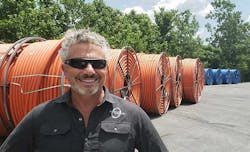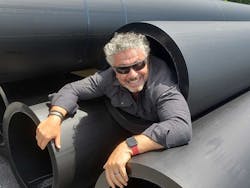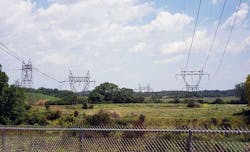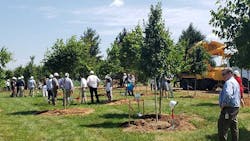Quantum Loophole Expands its Vision for Massive Data Center Cities
ADAMSTOWN, Md. – Creating gigantic data center campuses takes time and planning. As it breaks ground on its first mega-campus in Maryland, data center developer Quantum Loophole is laying the groundwork for similar “data center cities” to serve the Dallas, Chicago and Silicon Valley markets. Each project will span at least 1,000 acres, according to Quantum Loophole CEO Josh Snowhorn.
“In some areas we may seek to assemble up to 10,000 acres if we can,” said Snowhorn. “We take a very big view of everything. We’re doing site selection for everybody and taking care of their problems, including land, water, power and fiber. And then our customers can just come and deploy capacity.”
Snowhorn sees a future in which his massive projects shift major chunks of Internet infrastructure away from crowded urban and suburban landscapes, and onto campuses designed entirely around the needs of hyperscale operators. It’s a vision of cloud campuses built for the world of 2024, with room to support the digital shift sweeping society, as well as a ground-up focus on sustainability.
The first Quantum Loophole campus here in Frederick County won’t come online until early 2024, but is expected to arrive with 2,000 acres of land, 1,080 megawatts of power, and infrastructure to support energy strategies integrating natural gas, energy storage, and hydrogen. It will tap the massive power infrastructure of the former Alcoa Eastalco Works smelting plant, which offers a gigawatt of transmission power capacity.
Quantum Loophole is also looking to create a new geographic sub-market to support the massive cloud cluster in Northern Virginia, extending the market across the Potomac into Maryland. Adamstown is about 20 miles north of Ashburn, the key regional connectivity hub.
The company received a vote of confidence in its vision with the recent announcement that Aligned Data Centers has signed an agreement to acquire land, power, and water on the campus. Aligned, which is experiencing strong growth and operates two large data centers in Ashburn.
In addition to working directly with hyperscale tenants, Quantum Loophole expects to support any multi-tenant operators like Aligned. “We’re the wholesaler to the wholesalers,” said Snowhorn.
Adding Fiber at Hyperscale Volume
“This is the culmination of years of work,” said Snowhorn. “It’s a community-oriented project in the data center industry and of a scale that has never appeared before in the world.”
The Alcoa site in Adamstown has lots of infrastructure that can support scale. The one thing it is lacking is fiber that will tie the site to the strategic data center cluster in Northern Virginia.
Quantum Loophole means to address that with an ambitious project to create a cross-river fiber ring connecting the Adamstown campus and a data center cluster in Leesburg, which will tie into the data center districts in Ashburn and Manassas via a “NoVa mesh,” said Snowhorn, who has deep connectivity experience from running interconnection operations at CyrusOne and Terremark.
After a year of lining up permits, the fiber project breaks ground July 5, and will include a series of sub-river tunnels, with the Western route crossing the Potomac River while the Eastern route will cross the Potomac and the Monocacy River.
Those tunnels will house massive 26-inch-wide conduits, which will contain 2-inch innerducts to contain high-capacity cables with 6,912 fibers each. The end result will be 235,000 strands of fiber running under the Potomac to connect Frederick County and Leesburg.
The scope of the project can be seen in the infrastructure being stored on the Quantum Loophole Frederick campus, including stacks of conduit and reels and reels of innerduct. The conduit is big enough to crawl through, as Snowhorn likes to illustrate by climbing into them.
Quantum Loophole CEO Josh Snowhorn inside one of the 26-inch fiber conduits that will under the Potomac River in the company’s new fiber ring. (Photo: Rich Miller)
The site has electrical infrastructure in place to support the Alcoa plant, whose smelters created aluminum through electrolysis, which used an enormous volume of electricity until the plant closd for good in 2010. Several high-capacity 230 kV power lines run through the property, and Quantum Loophole will build a 1,080-megawatt substation, which should come online in early 2024, Snowhorn said.
“I don’t know anyone who has access to 1000 megawatts in the next 20 months,” he said.
Power towers carrying high-capacity electricity onto the Quantum Loophole campus in Frederick County, Maryland. (Photo: Rich Miller)
Quantum Loophole also plans to offer clients new approaches to backup power and network management. The campus will include a “battery farm” to offer large-scale energy storage, as well as a robotic cross-connect system to automate interconnections. The site also has access to a major natural gas line to support on-site power generation and hydrogen that can be used for “blue hydrogen” that can serve as an alternate fuel source for backup power.
This is a capital-intensive vision. TPG Real Estate Partners (TREP) is the project’s capital partner, and is the real estate arm of asset investment firm TPG, which manages more than $100 billion in assets.
The transformation of the Alcoa site aligns with the trend of converting power-intensive industrial sites to support the new digital economy. Data centers are an important component of this movement. Snowhorn says the company wants to take this approach to other markets as well, naming Dallas, Chicago and Silicon Valley as the focus of future projects.
This super-sizing of data centers is a theme Data Center Frontier has been tracking over the last five years, noting capacity design trends in hyperscale campuses and the developers that serve cloud clients.
Maryland Looks to Become a Data Center Destination
Maryland has always had plenty of land adjacent to the Ashburn cluster, but had only attracted two major data center projects, for the Social Security Administration and Fannie Mae. The development math shifted in July 2020 when Maryland enacted new tax breaks for the data center industry, including exemptions from state sales and use tax for investments of $5 million or more.
Electricity at the Frederick County site will be priced at an attractive 4.4 cents per kilowatt hour.
One big difference is that Frederick County has lots of affordable land and is seeking to welcome data center development. That’s a contrast to Northern Virginia, where cloud builders’ appetite for real estate has left a limited supply of development parcels. Land for data center development ranges from $1 million an acre in Prince William County to more than $3 million an acre for prime parcels in “Data Center Alley” in Ashburn in Loudoun County.
Efforts to establish large data center parks in Virginia are encountering resistance from community groups and public officials. In Prince William County, the potentially huge PW Digital Gateway project is fielding applications for hundreds of acres of data centers, but is also prompting protests from community groups. In Loudoun County, the proposed Dulles Cloud South area could support up to 56 million square feet of data center development, but some members of the county land use committee have objected to the location.
Engaging With the Community
In Frederick County, efforts to create a mega-campus have landed differently.
“We think this is a perfect site for data centers,” said Jan Gardner, the County Executive for Frederick County. “We’re happy to bring activity and jobs back here. And Quantum Loophole fit our vision for this site. It’s probably the largest single parcel of land in the Mid-Atlantic region. We think it’s a win-win for everybody.”
Frederick County has no business personal property tax, as well as a fast track permitting process similar to the one that has helped accelerate data center growth in Loudoun County.
A tree-planting ceremony was part of the groundbreaking at the Quantum Loophole campus in Frederick County, Maryland. (Photo: Rich Miller)
Quantum Loophole’ says its master-planned approach to site development aligns with the Livable Frederick Master Plan (LFMP) and accounts for historic sites and archaeological resources, as well as its impact on the environment. That was reflected in a groundbreaking last Friday, in which attendees helped plant trees at the site. The campus will have 52 acres in conservation, and the new owners want to create a community center adjacent to Carrollton Manor, a historic home owned by Charles Carroll, a signer of the Declaration of Independence.
The company has developed a “Bees and Trees” initiative to rebuild local ecosystems for pollinators including bees, butterflies, beetles, birds, and bats. Quantum Loophole has outlined plans to restore the Tuscarora Creek and other waterways, plant more trees and promote biodiversity on its campus.
“We really applaud a business that’s conscious of the community and engaged with the community,” said Gardner.
“The data center industry wants to do good things,” said Scott Noteboom, an industry veteran and Chief Technology Officer for Quantum Loophole. “We’re able to build something that fits in the nature of Frederick County and works for the data center industry.
The tree-planting is part of that philosophy.
“We’re adding a tremendous amount of aforestation,” said Noteboom. “When we have to take out older trees, we relocate those trees. When we can’t we locate them, we reuse the lumber on our site. Alcoa epitomized dirty industrial property. To turn this into a Clean Green Cloud City is an accomplishment.”
About the Author





